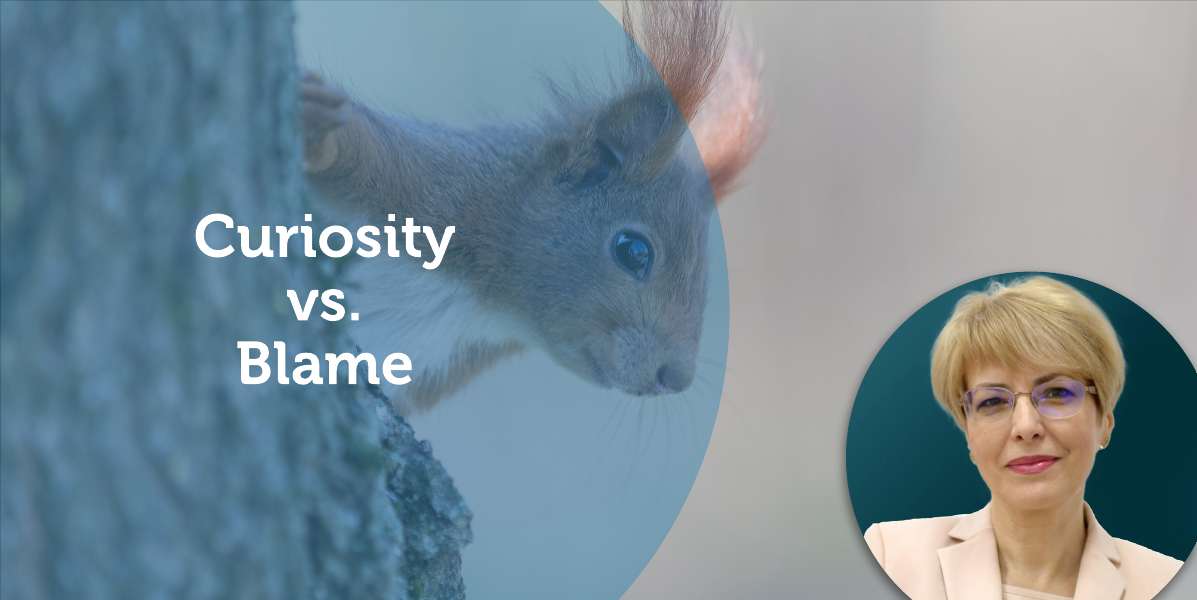 A Coaching Power Tool Created by Daniela Croitoru
A Coaching Power Tool Created by Daniela Croitoru
(Executive Coach, ROMANIA)
As humans, we are fundamentally wired to play as teams, but in the absence of real, authentic trusting relationships, we create faux teamwork. Many times, we notice within teams following behaviors:
Blame is the number one toxic behavior inside of organizations. When the teams live and work in a blame-gaming environment is the nearly complete absence of proactivity the conversation.
Where there is blame, there is no learning. Where there is blame, open minds close, inquiry tends to cease, and the desire to understand the whole system diminishes. When people work in an atmosphere of blame, they naturally cover up their errors and hide their real concerns. And when energy goes into finger-pointing, scapegoating, and denying responsibility, productivity suffers because the organization lacks information about the real state of affairs
Definition of Blame
Feel or declare that (someone or something) is responsible for a fault or wrong.
Case study
John is a very oriented results person with many technical skills and showed up at a meeting where there is no agenda, no clear goals, and no actionable conversation. Because he needs a goal, he was sitting through the meeting and fuming inside expected to something to worthless. He disengaged from the conversation and not participated because no one put a goal out there. He blamed the meeting organizer for not having a meeting agenda.
After a while, he got out of the smartphone and checked out his emails creating a barrier between him and colleagues. He shoots off a text to another colleague in the meeting and says: “can you believe this? This is insanity “He gets back: ”meetings are such a wasting time” and felt a sense of connection that they both felt the same frustration.
It is obvious that the meeting was not an efficient one.
What if John and his colleague would have been curious about the situation and would have given up on blaming the meeting organizer?
Definition of curiosity
- Desire to know; a: inquisitive interest in others’ concerns: NOSINESS
- Inquisitiveness; the tendency to ask to learn about things by asking questions, investigating, or exploring.
Curiosity is essential, not only to learn but to understand human behaviour. In the end, it’s relationship that counts. – Eccentric Shailesh
Curiosity is the willingness to step back when things are not working and to consider that we might be trying to solve a problem we do not fully understand. Curiosity, on the other hand, is the desire to inquire more deeply into why something is happening, and the willingness to acknowledge that espoused solutions might not always be right.
Reflection
What if John would have been curious and been ready to build on others’ ideas? What would have been the result of the meeting if instead of criticism, he had raised the hand and in a respectful, nonjudgmental way, he would have said: “I’m noticing that we have no clarity about what we are trying to accomplish. What is important for us today? How could I help?”
This behavior is an open, the curious one, and concerned with other needs and contribution.
Curiosity is the process of asking questions, genuine questions, that are not leading to an ask for something in return. Brian Grazer
Coaching application
To achieve synergy within teams so that increase performance both at the team level and individually, within the coaching process, as a coach, we can support the clients in understanding the benefits of curiosity behavior and apply it.
We can help clients to play with curiosity at three levels: context, self-awareness and other awareness.
Analyzing the context
It is necessary to be conscious of the degree to which we are applying our abilities, skills, strengths within a context or situation. As a situation change, we may need to consider these questions:
Self-awareness
We are conscious of the way our needs tug and pull at us. On the one hand, we want to contribute, on the other hand, we may feel need to sit back, take things in and wait for others’ contributions.
Self-awareness allows us to see how our strengths help us to contribute, considering these questions:
Others awareness
It is not enough to discover what is happening with the situation or with you in response to the situation – it looks to understand how others are experiencing the situation as well.
As well, it is necessary to consider what contributions and needs they have and what you could offer to serve the situational needs and goals.
We keep moving forward, opening new doors, and doing new things, because we’re curious and curiosity keeps leading us down new paths. Walt Disney
In order to step forward through the transforming process from blame to curiosity, we help the client to discover:
- the desired results
- possible barriers
- lessons from past success
- action
Reflection
Reference
www.peopleacuity.com
Shift Up!: Strengths Strategies for Optimal Living – DeAnna Murphy
www.CoachCampus.com – Enhancing strengths